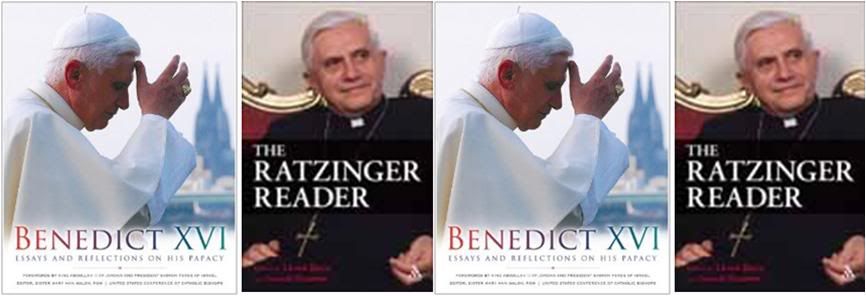 Except shortly after the Conclave of 2005, it's very unusual that two books in English about Joseph Ratzinger/Benedict XVI come out at the same time...
Except shortly after the Conclave of 2005, it's very unusual that two books in English about Joseph Ratzinger/Benedict XVI come out at the same time...
Here's a look at this fall's twin offering...
Benedict XVI:
'One of the last truly great
European voices' against secularism
By Brian Welter

Oct. 6, 2010
BENEDICT XVI: ESSAYS AND REFLECTIONS ON HIS PAPACY
Edited by Sister Mary Ann Walsh, RSM
Sheed & Ward, 224 pp., $29.95
THE RATZINGER READER: MAPPING A THEOLOGICAL JOURNEY
by Joseph Ratzinger
Edited by Lieven Boeve and Gerard Mannion
Continuum, 286 pages, $34.95
While Pope Benedict XVI is undoubtedly a much different Pope than John Paul II was, the depth of the current Pontiff’s pastoral
concerns are, surprisingly to some, as deep as his predecessor’s. Few would have foreseen that such a brilliant, often polemical
man could possess these qualities. [What a negative premise to start from! And why was it necessary to, yet again, bring up a comparison with
John Paul II?]
Yet writer after writer in
Benedict XVI: Essays and Reflections on His Papacy, a collection of the thoughts from Catholic
America, extols not the former Cardinal Joseph Ratzinger’s intellect, as formidable as that is, but
his personality
[of which his intellect is but one part!].
Contributors tell of their encounters with Benedict the pastoral Pope, as when he came to the United States and reached out to
victims of abusive priests.
Or when he wrote a pastoral letter to Chinese Catholics, again reaching out and asking for unity within the Chinese Catholic
Church fractured into the underground and the governmentally sanctioned parts.
Or when he began to be seen as a “green pope” for putting solar panels on the Vatican and appealing to safeguard the
environment. As one writer notes, he has made a unique contribution to the environmental movement by linking “natural
ecology” with “human ecology.” In other words, how it goes with our families and communities is how it goes with our
treatment of nature.
The current Pontiff has continued Pope John Paul II’s concern for human rights, as when he linked human rights with
forgiveness, and noted that peace was “relational.”
Yet the contributors to
Essays and Reflections on His Papacy are nonetheless impressed by the former Cardinal Ratzinger’s
deep intellect. He critiques the Protestant over-reliance on Scripture (“sola scriptura”) for undervaluing tradition and making
“faith depend on the always-changing findings of scholars.”
This traditionalist Pope therefore appreciates liturgy, sharing in the concern of many American Catholics over the sloppiness in
postconciliar worship.
Pope Benedict’s traditional stance is likewise apparent in
The Ratzinger Reader, a collection of his writings as a “private
theologian,” that is, when he publishes essays and books as an individual rather than when speaking as a Vatican official.
The reader includes succinct commentaries by the editors, which helpfully situate Cardinal Ratzinger’s thoughts within the
secular versus Catholic battleground in the decades following the Second Vatican Council.
The commentators, Lieven Boeve and Gerard Mannion, argue that
Cardinal Ratzinger has not deeply changed
his basic positions, even though many others, such as Father Hans Kung, have accused the current Pontiff of just that.
Cardinal Ratzinger highlighted a more traditionalist position as the 1970s wore on. However, this was not so
much a reactionary stance as it was the position of a priest who was deeply concerned with the secularization mot
only of Western society, but within the Church itself, as many seminaries, religious orders and Catholic schools
lost a sense of being Catholic.
In one writing, Cardinal Ratzinger calls on the faithful to become more deliberate in the way in which Catholic education or
health care is indeed Catholic.
Some of the writings testify to the polemical style with which Cardinal Ratzinger often defended the faith. His strong words
extend to his ecclesiastical brethren who misunderstood the council: “The tragic one-sidedness of the last conciliar debates
came about because they were controlled by the trauma of underdevelopment and by a pathos of ‘caught-up modernity.’”
The polemical nature of some selections in no way reduces the elegance, precision and clarity of Cardinal Ratzinger’s writings.
This reader also indicates why he is becoming so popular with Catholics.
Not only is he the pastoral Pope, as witnessed by
Essays and Reflections on His Papacy, but he is one of the last truly great
European voices against the continent’s wholesale rejection of its Christian heritage.
Welter is studying for his doctorate in systematic theology and teaching English in Taiwan.
[Modificato da TERESA BENEDETTA 06/10/2010 19:10]